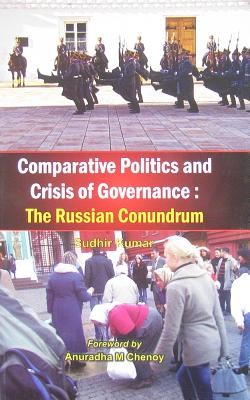
- We will send in 10–14 business days.
- Author: Sudhir Kumar
- Publisher: VIJ BOOKS INDIA
- Year: 2011
- Pages: 160
- ISBN-10: 9380177666
- ISBN-13: 9789380177663
- Format: 15.6 x 23.4 x 1.1 cm, kieti viršeliai
- Language: English
- SAVE -10% with code: EXTRA
Reviews
Description
Democracy as a political system, its creation and evolution and implications on the people and the states has been the dominant subject matter of the comparative politics in the last five decades. The litmus test of such explanations has been the societies undergoing political transition, switching over from authoritarian political systems to democratic ones. This book is an attempt to critically analyze the theories which have come up in the case of post-Soviet states' political transition began after the collapse of the Soviet Union. The book argues that democratization should be seen as a broader phenomenon with the objective of building an equal and just social order. Secondly, the dilemma of explaining democracy in theory and in practice can be better explained with the analysis of the nature of state i.e. who governs and how. Thirdly, the nature of any state should be measured on the principles of democratic governance. Here three major indicators of democratic governance have been selected: participation, transparency, and accountability. Analysing Russia within this research framework the book argues that despite having all the capabilities to be a strong state the Russian state has been facing acute crisis of governance being reflected in violent separatist movements, violation of constitutional laws and increasing crime rate. A major reason behind the crisis of governance in Russia is the lack of application of principles of democratic governance at various levels of transition: from the constitution making process to implementation of welfare and other public policies.
EXTRA 10 % discount with code: EXTRA
The promotion ends in 21d.21:44:46
The discount code is valid when purchasing from 10 €. Discounts do not stack.
- Author: Sudhir Kumar
- Publisher: VIJ BOOKS INDIA
- Year: 2011
- Pages: 160
- ISBN-10: 9380177666
- ISBN-13: 9789380177663
- Format: 15.6 x 23.4 x 1.1 cm, kieti viršeliai
- Language: English English
Democracy as a political system, its creation and evolution and implications on the people and the states has been the dominant subject matter of the comparative politics in the last five decades. The litmus test of such explanations has been the societies undergoing political transition, switching over from authoritarian political systems to democratic ones. This book is an attempt to critically analyze the theories which have come up in the case of post-Soviet states' political transition began after the collapse of the Soviet Union. The book argues that democratization should be seen as a broader phenomenon with the objective of building an equal and just social order. Secondly, the dilemma of explaining democracy in theory and in practice can be better explained with the analysis of the nature of state i.e. who governs and how. Thirdly, the nature of any state should be measured on the principles of democratic governance. Here three major indicators of democratic governance have been selected: participation, transparency, and accountability. Analysing Russia within this research framework the book argues that despite having all the capabilities to be a strong state the Russian state has been facing acute crisis of governance being reflected in violent separatist movements, violation of constitutional laws and increasing crime rate. A major reason behind the crisis of governance in Russia is the lack of application of principles of democratic governance at various levels of transition: from the constitution making process to implementation of welfare and other public policies.


Reviews